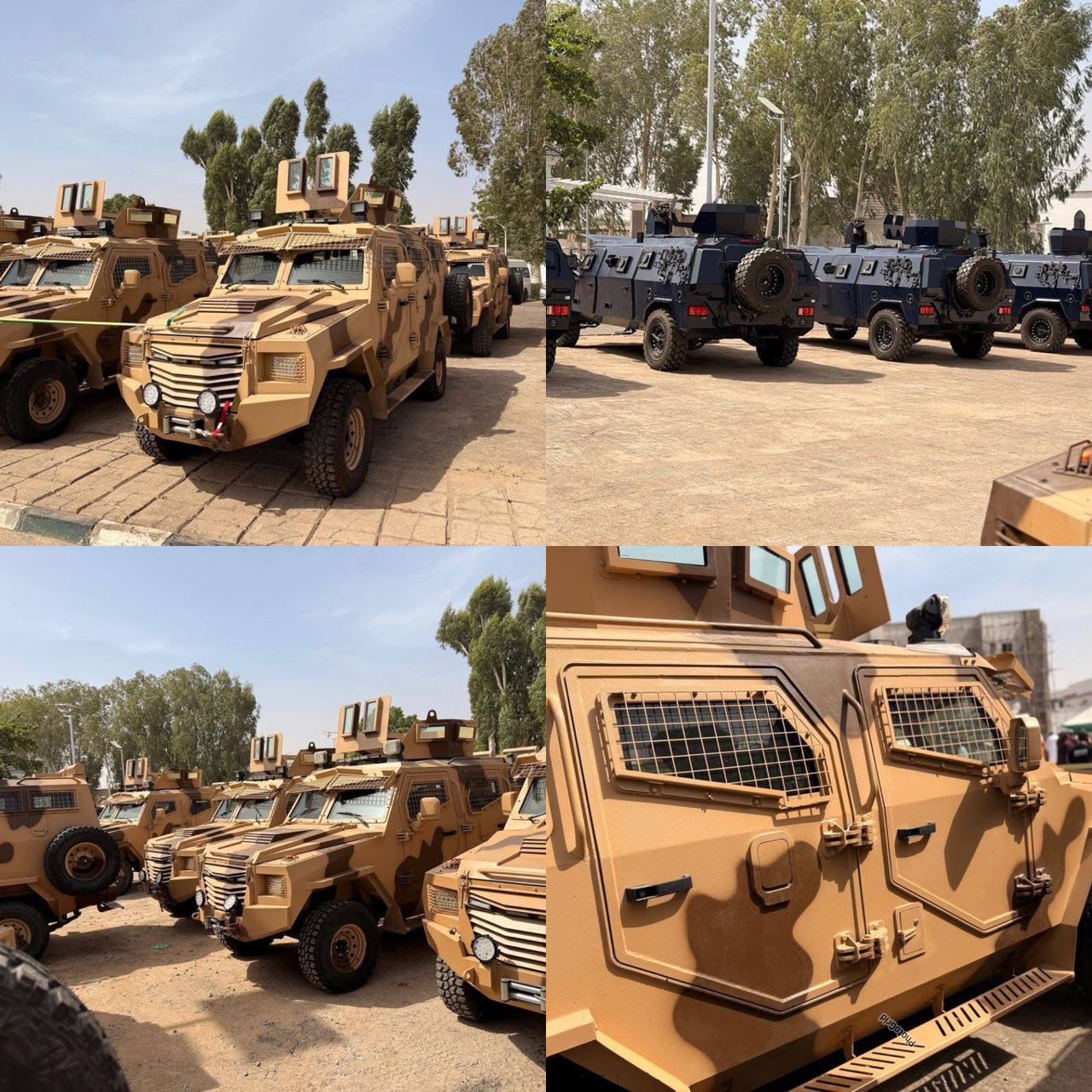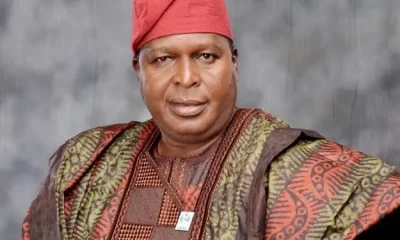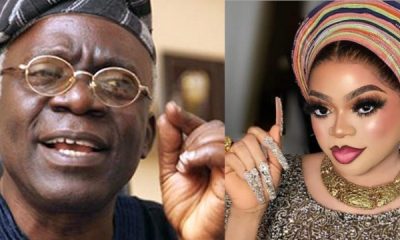society
Bobrisky: Reps grill EFCC, NCoS officials over bribery allegations

Bobrisky: Reps grill EFCC, NCoS officials over bribery allegations
The House of Representatives, on Monday, grilled officials of the Economic and Financial Crimes Commission and the Nigerian Correctional Service over allegations that the two agencies were bribed by controversial cross-dresser Idris Okuneye, alias Bobrisky, following his conviction and sentencing for abuse of the naira in April.
During the hearing, both the EFCC and the NCoS officials denied the bribery allegations. The EFCC refuted claims that Bobrisky paid N15 million to have the money laundering charges against him dropped, while the NCoS insisted that Bobrisky served his term at the Kirikiri Maximum Correctional Centre and not in a private apartment as alleged.
Bobrisky was convicted on April 5, 2024, by the Federal High Court in Lagos and sentenced to six months in prison for abuse of the naira. On August 5, 2024, the self-acclaimed “Mummy of Lagos” regained his freedom amid allegations of receiving preferential treatment while in custody due to his fame as a media personality.
Last week, a social media influencer, Martins Otse, popularly known as VeryDarkMan, released an audio recording purportedly made by Bobrisky, in which he claimed that after his conviction and sentencing, an unnamed godfather, in collaboration with the Controller General of the Nigerian Correctional Service, arranged for him to serve his six-month sentence in a private apartment.
In the audio shared by VDM, Bobrisky was alleged to have claimed that he paid as much as N15m to EFCC officials to drop the money laundering charges against him.
Following these allegations, the Minister of Interior, Olubunmi Tunji-Ojo, ordered a probe and the immediate suspension of the Deputy Controller of Corrections in charge of the Medium Security Custodial Centre, Kirikiri, Lagos State, Michael Anugwa, and the Deputy Controller of Corrections in charge of the Maximum Security Custodial Centre, Kirikiri, Lagos State, Sikiru Adekunle.
Additionally, last week, the House of Representatives resolved to invite Bobrisky, VDM, the EFCC, and the NCoS for questioning over the matter.
Appearing before the Reps Joint Committee on Monday, Anugwa stated that when Bobrisky was brought to the Medium Security Custodial Centre, Ikoyi, Lagos, he refused to eat the prison rations, preferring to make personal arrangements for his feeding. He added that this practice is guaranteed under the nation’s laws.
On why Bobrisky was kept in a different cell away from other inmates, Anugwa explained, “During the admission of the inmate (Bobrisky), we discovered that he had two features. We did not know where to place him because, for instance, he had breasts. We had to take him to Room 2 in the B Ward. This is also in line with global best practices as approved by the United Nations.”
Regarding Bobrisky’s transfer to the Maximum Security Custodial Centre, Anugwa said, “Friends of Bobrisky bought plastic chairs and brought them to the centre. There was so much media hype that he had to be moved to Kirikiri for security.”
When asked if the donation of chairs could have influenced Bobrisky’s movement from Ikoyi to Kirikiri, Anugwa declined to comment, but added that it is a tradition for inmates to make donations to authorities while in custody.
He denied the allegation that Bobrisky was held outside the walls of a correctional facility, stating, “Bobrisky was admitted on April 13, with a valid warrant and a transfer order from Ikoyi Correctional Facility. The warrant was given to me the same day of his conviction. The biometric was taken the next day because he came around 10:30 PM. Okuneye spent 10 days at a medium correctional centre and was moved to maximum because he refused to eat the prison food and then applied for self-feeding, which was approved. Bobrisky nominated two people to bring his food to the facility, Abiola Okuneye and Moji Okuneye. During the admission, we discovered that Idris, though a man, had special features like breasts that would not allow us to put him in the general cell. We agreed to put him in a separate cell. While he was there, he had a total of 39 visitors.”
Echoing Anugwa’s position, the Assistant Controller General of NCoS in charge of the Kirikiri Maximum Security Centre, Ben-Rabbi Freeman, said he transported Bobrisky to Kirikiri in his official car.
“The transfer from Ikoyi to Kirikiri was purely for security purposes. The inmate (Bobrisky) was taken to the maximum facility in my official car,” Freeman said.
When asked if he was on suspension, the Deputy Controller elicited prolonged laughter at the investigative hearing when he said he learned about his fate via a press release. “The suspension was in the form of a press release,” he said.
When pressed further to clarify his position, Anugwa added, “It was a social media suspension, sir,” a remark that sent the audience into another bout of laughter.
However, the NCoS, in a statement signed by its spokesperson, Umar Abubakar, labeled Anugwa’s actions as an attempt to mislead the public.
“For the avoidance of doubt, the Nigerian Correctional Service suspended not only the said officer in the video but three other officers following their alleged roles in various misconducts to allow for further investigation. The suspended officers include the officer in charge of the Maximum Security Custodial Centre, Kirikiri, Lagos, Deputy Controller of Corrections Sikiru Adekunle; the officer in charge of the Medium Security Custodial Centre, Kirikiri, Lagos, Deputy Controller of Corrections Michael Anugwa; the officer in charge of the Medium Security Custodial Centre, Kuje, FCT command, DCC Kevin Ikechukwu Iloafonsi; and Assistant Superintendent of Corrections Ogbule Samuel Obinna of the Medium Security Custodial Centre, Abakaliki, Ebonyi State,” Abubakar said.
VeryDarkMan apeaks on allegation
Meanwhile, VeryDarkMan, who initially declined to speak unless Bobrisky was produced, later agreed to comment after committee members and his lawyer, Deji Adeyanju, urged him to have a change of mind.
Speaking on his allegations, VeryDarkMan told the investigating committee that he obtained his audio recording from someone who lent Bobrisky N4m.
“Bobrisky claimed he had a godfather. I don’t know if that godfather is here, so I will present my evidence one at a time as I have more audio recordings,” he said.
Also speaking, Bobrisky’s lawyer, Avwerosuoghene Omuvwie, informed the House panel that his client could not honor the invitation due to ill health.
However, this did not sit well with the committee, which demanded medical proof to support the claim. A committee member, Patrick Umoh (PDP, Akwa Ibom), warned that the panel would not entertain frivolous excuses in the future, stating, “We hope that the next time we invite him, he will be well.”
EFCC defends allegation
Meanwhile, the Chief of Staff to the EFCC Chairman, Ola Olukoyede, Michael Nzekwe, who represented his principal at the investigative hearing, explained why the commission dropped money laundering charges against Bobrisky. According to him, the charges were dropped because Bobrisky had pleaded guilty in his confessional statement.
He urged the House to “use its constitutional power to ensure that corruption and other vices are exposed, investigated, and prosecuted, and also to ensure that patriotic and dedicated officers are not blackmailed, demonized, and demoralized for faithfully serving and carrying out their lawful duties.”
“The commission has been consistent in its advocacy, calling on the public with credible information on alleged acts of corruption involving any of its officers to come forward with evidence. The public is urged to do so responsibly.
“Short of the ex-convict and other accusers openly naming the officers of the commission to whom they allegedly gave the bribe of N15m in order to influence the dropping of counts 5 and 6 of the charge bordering on money laundering, it is reasonable to infer that the ex-convict merely made up the story to convince the yet-to-be-identified person he was speaking with to obtain financial favors under false pretenses by dropping the name of the commission.
“We wish to draw the attention of the Honorable House to the fact that the onus of proving this grievous allegation against officials of the commission rests squarely on the accusers in this case: the ex-convict and VeryDarkMan. It is noteworthy that the commission extended an invitation to both the ex-convict and VeryDarkMan to assist in unraveling the identities of the officers of the commission to whom the alleged bribe of N15n was paid,” the EFCC stated.
The Chairman of the Committee, Ginger Onwusibe, however, indicated that at the next meeting, the person who recorded the audio should appear before the committee, while the meeting was adjourned sine die.
society
Good Politics Or Just Power? Two Years After The Elections

Good Politics Or Just Power? Two Years After The Elections
Two years after the last general election, Nigerians are justified in asking a direct question: is our democracy stronger today than it was then? Democracy is not measured by how many offices a party controls or how loudly politicians speak. It is measured by integrity, accountability, and the lived experience of the people. Good Politics demands more than victory at the polls; it demands moral leadership and visible progress in the lives of citizens.
The debate over amendments to the Electoral Act should have provided an opportunity to deepen transparency and strengthen public confidence. Instead, hesitation to fully embrace reforms that safeguard credible vote transmission and accountability has fueled doubt. In a nation where electoral credibility remains fragile, any reluctance to reinforce safeguards sends the wrong signal. Good Politics stands firmly for processes that are open, fair, and beyond suspicion.
The party in power commands significant authority across the federation. With control of the presidency, many state governments, a strong presence in the National Assembly, and influence at local levels, there should be no anxiety about reforms that ensure free and fair elections. Confidence in leadership is demonstrated not by dominance, but by a willingness to subject power to scrutiny. Politics rooted in the omoluabi ethos embraces fairness, transparency, and responsibility, even when inconvenient.
This is the standard long associated with Awolowo, whose politics emphasized discipline, social welfare, education, and institutional strength. His vision was not merely about holding office, but about transforming society through principled governance. Good Politics follows that tradition. It rejects manipulation, arrogance, and the concentration of power without accountability. It insists that authority must serve the people, not itself.
Beyond electoral reforms, democracy must deliver tangible relief. Across the country, households struggle with rising prices and shrinking purchasing power. Small businesses are burdened by escalating costs. Young people search for opportunities that remain scarce. When economic hardship deepens, democracy feels abstract. Good Politics recognizes that political legitimacy is reinforced when citizens can see and feel the benefits of governance.
The concentration of power within a single political structure should translate into coordinated reform and measurable development. When it does not, questions naturally arise. Democracy weakens when dominance replaces performance. It weakens when loyalty to party eclipses loyalty to principle. The omoluabi tradition teaches that character defines leadership. Without character, authority becomes hollow.
A healthy democracy requires credible elections and compassionate governance. It requires leaders who understand that politics is a moral enterprise. Two years into this administration, many Nigerians remain uncertain about the direction of both our democratic processes and their daily welfare. If democracy is to endure, it must reflect Good Politics: fairness in competition, integrity in conduct, and compassion in governance. Anything less falls short of the standard that our history and our values demand.
news
GEN CHRISTOPHER GWABIN MUSA SUPPORT INITIATIVE COMMENDS STATE-FEDERAL COLLABORATION IN ZAMFARA

GEN CHRISTOPHER GWABIN MUSA SUPPORT INITIATIVE COMMENDS STATE-FEDERAL COLLABORATION IN ZAMFARA
The Gen Christopher Gwabin Musa Support Initiative (GCGMSI) has commended the Zamfara State Government for its decisive contribution to security operations through the donation of newly acquired armoured personnel carriers (APCs), surveillance drones, and other critical operational equipment to troops and security agencies in the state.
This commendation was contained in a statement signed by the Convener of the GCGMSI, Ibrahim Dahiru Danfulani, Sadaukin Garkuwan Keffi/Betara Biu, and made available to the press.
The equipment was formally commissioned on Wednesday, February 18, by the Grand Patron of the GCGMSI and Minister of Defence, General Christopher Gwabin Musa, OFR (rtd.), in a ceremony at the Government House, Gusau. The event was attended by senior military officers, heads of security agencies, and top officials of the Zamfara State Government.
The GCGMSI, in its statement, hailed the donation as a “transformative and timely intervention” that aligns perfectly with its core objective of advocating for and supporting tangible measures that enhance the operational capacity and welfare of Nigeria’s security forces. The Initiative praised Governor Dauda Lawal’s administration for moving beyond rhetoric to actionable, material support, describing the move as a “blueprint for state-level collaboration in national security.”
“The provision of these assets by the Zamfara State Government is a testament to visionary leadership and a profound commitment to the peace and stability of its people,” the GCGMSI statement read. “It represents the exact kind of synergistic partnership between state and federal authorities that the GCGMSI champions. This initiative will significantly close operational gaps, boost the confidence of our gallant troops, and send a strong message to criminal elements.”
Speaking at the commissioning, General Musa emphasized that sustained collaboration is indispensable in confronting the nation’s evolving security challenges. He specifically commended Governor Lawal for his proactive support.
“Governor Dauda Lawal has demonstrated exemplary leadership and an unwavering dedication to the security of Zamfara State,” the Defence Minister stated. “The provision of these armoured vehicles, surveillance drones, and other operational equipment will undoubtedly boost the morale and operational effectiveness of our troops and other security agencies on the ground. This is a commendable effort that should be emulated by others.”
The newly commissioned assets, which include multiple APCs and advanced surveillance drones, are expected to dramatically enhance the mobility, protection, intelligence-gathering, and rapid response capabilities of security forces, particularly in the state’s remote and difficult terrains where anti-banditry operations are ongoing.
In his remarks, Governor Lawal reiterated his administration’s steadfast commitment to being a reliable partner in the security architecture. He urged security agencies to deploy the new resources responsibly and effectively to safeguard lives and property.
The Federal Government, through the Ministry of Defence, reaffirmed its commitment to continuing and deepening such partnerships with state governments across the nation to strengthen coordination and resource allocation in the collective fight against insecurity.
The GCGMSI concluded its statement by urging other state governments to take a cue from Zamfara’s “bold and pragmatic” approach, affirming that such concrete support is vital for achieving lasting peace and security across Nigeria.
society
Governor Dauda Lawal Commissions 25 Armoured Personnel Carriers, Aerial Surveillance Drones to Combat Insecurity

Governor Dauda Lawal Commissions 25 Armoured Personnel Carriers, Aerial Surveillance Drones to Combat Insecurity
In a major boost to the fight against banditry and insecurity in Zamfara State and the North-West Zone, Zamfara State Governor, His Excellency, Dr Dauda Lawal, on Wednesday commissioned 25 new Armoured Personnel Carriers (APCs) and sets of surveillance drones for the military and other security agencies operating in the state.
The event, which took place in Gusau, was part of the state government’s ongoing effort to provide structured logistical support to frontline security forces and combat insurgency, banditry, and protect lives and properties. Speaking at the commissioning and handover, Governor Lawal emphasised that the new assets are intended to enhance troop protection during high-risk deployments and improve rapid response capabilities in remote communities, ensuring tactical battle and overhead surveillance for victory.
“We have provided over 600 specialised motorcycles, 150 Hilux vehicles, and 20 Buffalo vehicles to our security forces. These 25 highly sophisticated APCs being commissioned today are therefore part of a broader reform to improve response to security threats. The APC’s significantly improves troop protection during deployments into high-risk areas. They reduce vulnerability during patrols, support convoy security along major routes, and strengthen rapid response capability when distress calls arise from remote communities.” the Governor stated.
Governor Lawal explained that the security challenges of recent years had disrupted farming, limited trade, and undermined public confidence across the state. He noted that his administration’s “Rescue Mission” agenda has focused on moving from fragmented responses to structured reforms, including the establishment of a Zamfara State Security Trust Fund and the operationalisation of Community Protection Guards to improve grassroots intelligence.
The Governor specifically highlighted the importance of integrating modern technology into security operations. He noted that the newly acquired drones would expand aerial surveillance, improve situational awareness, and support better coordination between command centres and troops in the field.
“Real-time information strengthens decision-making and reduces operational blind spots,” he added.
Governor Lawal however acknowledged the critical role of the Federal Government under President Bola Ahmed Tinubu, noting that recent federal budgets have allocated over three trillion naira to defence, a commitment he said strengthens subnational stabilisation efforts.
He urged the military commanders and personnel receiving the equipment to ensure disciplined maintenance and intelligence-guided deployment. “Enhancing your safety enhances the safety of our communities,” he told the troops.
Governor Lawal also told the people of Zamfara that; his administration remains resolute in restoring enduring security and peace across every Local Government Area. “We will sustain preventive measures, strengthen patrol architecture in rural corridors, deepen inter-state intelligence collaboration across the North-West, and maintain fiscal prudence in security expenditure. Stabilisation will continue through structured planning, lawful enforcement, and institutional reform.”
The Governor also linked the security investment to economic recovery, stressing that stability in rural areas is essential for agricultural productivity, market activity, and food security.
The event was attended by the Honourable Minister of Defence, General Christopher Musa (Rtd.), who formally commissioned the assets for operational service. Governor Lawal reaffirmed his administration’s resolve to sustain preventive measures and inter-state security collaboration until lasting peace is restored across all Local Government Areas in Zamfara.
-

 celebrity radar - gossips6 months ago
celebrity radar - gossips6 months agoWhy Babangida’s Hilltop Home Became Nigeria’s Political “Mecca”
-

 society6 months ago
society6 months agoPower is a Loan, Not a Possession: The Sacred Duty of Planting People
-

 society5 months ago
society5 months agoReligion: Africa’s Oldest Weapon of Enslavement and the Forgotten Truth
-

 news6 months ago
news6 months agoTHE APPOINTMENT OF WASIU AYINDE BY THE FEDERAL GOVERNMENT AS AN AMBASSADOR SOUNDS EMBARRASSING








